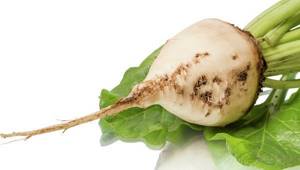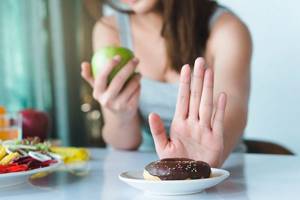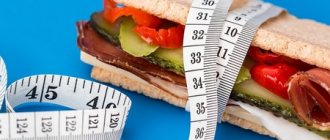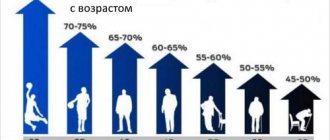History of sugar consumption
It is difficult to say with certainty when sugar appeared in the human diet. In any case, about 10 thousand years ago in New Guinea it was already obtained from sugar cane.
In Europe, they became acquainted with sugar much later; under Alexander the Great, “honey powder” was brought from the conquered Indian territories, and the crusaders, who tasted crystalline sugar in the Holy Land, called it sweet salt. Over time, sugar became cheaper and its consumption grew rapidly.
American statistics are indicative, according to which the average American at the beginning of the 19th century. absorbed about 3.5 kg of sugar per year, and in our time - over 50 kg.
Benefit and pleasure
Man, like most mammals, loves sweets and this love is innate. Sweet foods are rich in glucose, an important source of energy.
In order for the animal to diligently search for high-calorie healthy food when eating the “right” food, dopamine is released in one of the brain regions, the ventral striatum, which causes pleasure. In humans, the amount of dopamine released in the striatum directly correlates with the pleasure derived from food.
So the pleasure of eating is not an end in itself, but a mechanism that reinforces proper eating behavior. The purpose of nutrition is to maintain energy homeostasis.
Ventral striatum, known as the “reward center”
The need for food occurs when the body's energy reserves decrease. The brain learns about this from hormones. Insulin, a pancreatic hormone, reports the concentration of glucose in the blood plasma. Another hormone, leptin, is synthesized in fat cells, and the more fat, the more of the hormone.
High levels of insulin and leptin indicate that the body has a significant supply of energy and does not need food. If these hormones are low, then it’s time to eat. The same is signaled by the gastric hormone ghrelin, as well as intestinal signaling molecules.
Although leptin and ghrelin receptors are scattered throughout the body and central nervous system, the main collector of information from them is the hypothalamus, which plays an important role in regulating nutrition and metabolism.
Carrot and stick
However, the basic principle is clear: in order for animals and humans to eat properly, nature uses the carrot and stick method (experts talk about the metabolic and hedonic components of eating behavior). The role of the stick is played by homeostasis control, which increases the desire to eat as energy reserves are depleted, and the carrot is the natural pleasure derived from food.
This is food with appetite and pleasure, which I.P. wrote about. Pavlov. The combination of benefit and pleasure is an important evolutionary achievement that allows the animal to eat well without overeating.
But if nature has endowed us with the ability to enjoy food, is it any wonder that this is the method that people and animals use to lift their spirits?
To eat or not to eat?
One of the diagnostic signs of depressive disorder is changes in eating behavior. In humans, approximately a quarter of mood disorders are associated with obesity.
Psychologists have experimentally shown that in obese women, photographs of high-calorie foods activate the reward system. Images of low-calorie foods do not have this effect.
In women of normal build, photographs of ice cream and cakes excite other neurons that are not associated with the reward system. Overweight people evaluate high-calorie foods differently than healthy people; they have the wrong motivation.

Sugar beet
The desire to eat stress is understandable, and there would be nothing wrong with it if people pleased themselves with something safe, lettuce, for example. But there are few of these, not salad, but fatty, sweet food that lifts our mood. It is from such food that we get pleasure, we feel a taste for it.
Mice in sugar
Judging the quality of food begins with its taste. But animals also have another mechanism for regulating eating behavior, which depends not on the attractiveness of the product, but solely on its usefulness.
Duke University researchers wondered if the brain would be able to evaluate the nutritional value of a product whose taste it does not taste. If it is assessed, it means that the substances that are formed in the stomach and intestines during digestion also determine eating behavior. To test this hypothesis, the scientists used mutant mice lacking the TRPM5 protein. Mice with this mutation cannot taste the sweetness of sugar.
Mutant mice and animals with normal sensitivity were kept without water for some time, and then offered a choice of drinking bowls with water, 0.4 and 0.8 M sucrose solutions. Normal mice, having quickly tried the drink, choose sweet solutions, while mutants do not distinguish between water and sucrose.
But if for several days in a row the animals are offered a choice of plain and sweet water, and a constant place is kept at each drinking bowl, after six days the mutants remember where the sucrose solution is poured and consciously choose it, although they do not feel the taste.
Obviously, they feel what drink satiates them.

A Cambodian man carries palm sap, which is used to extract sugar, in Tuol, Cambodia.
Then sucrose was replaced with sucralose, a non-calorie but very sweet sugar substitute. In this case, ordinary mice prefer sucralose, but mutants do not care whether water or sucralose is used. The liquids did not differ in nutritional value, and the animals drank from both bottles with equal frequency.
The researchers concluded that the dopamine reward system in the ventral striatum responds not only to tasty food, but also to healthy food, even in the absence of a taste signal.
The baton was picked up by specialists from the City University of New York. Scientists were interested in how normal mice and mutants lacking TRPM5 would behave if they were offered several simple sugars that differ in sweetness and nutrition.
Mice with a normal taste system always choose sweet solutions rather than water. Normal animals rely on taste or a combination of smell and taste. Glucose and fructose are almost equally attractive to them, despite their different sweetness.
Mutant mice, as one would expect, focus on the nutritional value of the solution.
Glucose is the most attractive for them, the second position in the preference scale is occupied by galactose, then MDH, and only fructose is drunk by mutants who do not feel its sweetness more often than water.
Around the same time, the University of Southern California became interested in the difference in preferences between glucose and fructose. Only they worked with people.
The attention of researchers to fructose is not accidental. Since it has little effect on insulin and blood sugar levels, it is used all over the world as a sugar substitute for healthy eating.
But insulin signals to the brain that there is enough food, so sucrose and glucose cause a feeling of fullness, but fructose does not - on the contrary, in animals it stimulates appetite.
Less is known about the effects of fructose on human eating behavior.
How is food addiction born?
Scientists worked with 24 healthy volunteers who did not smoke, did not diet, or take hormonal medications. The volunteers' levels of glucose, fructose, insulin, leptin, ghrelin and some other substances - markers of satiety - were determined. At the beginning of the experiment, they were approximately the same for all participants.
After this, the volunteers drank 75 g of fructose or glucose dissolved in 300 ml of cherry-flavored water and went to look at the pictures. They were shown pictures of high-calorie foods (candy, cookies, hamburgers, pizza) and photographs that had nothing to do with food (buildings and baskets). The pictures were viewed in blocks, and after each block, participants rated how hungry they were.
And magnetic resonance imaging made it possible to determine which areas of the brain were active at this time.

Sugar cane
It turned out that people who drank a fructose solution feel hungrier than after taking glucose, and this data is objective: glucose increased the level of insulin in the blood of the subjects, but fructose practically did not. In addition, drinking fructose causes a noticeable difference in the activity of different regions of the brain while viewing food and non-food pictures.
At the sight of food, the visual cortex was more activated, although it does not directly affect appetite, the brain's reaction to the sight of foods characterizes cravings for them. In addition, images of hamburgers increase the activity of neurons in the orbital cortex and ventral striatum, the same way these neurons respond to real high-calorie food.
Why is it difficult to overcome sweet cravings?
The problem is that sweet cravings are the hardest thing to overcome. First of all, it's delicious. Secondly, sweets are a quick source of energy. For many, this is an ideal option for refreshment when time is short. Finally, store-bought confectionery products are addictive due to the presence of special additives in them. A person quickly becomes addicted to chocolate bars, cakes or cookies. It can be extremely difficult to overcome such a captivating habit. This is very beneficial for industrialists interested in increasing profits.

How to stop eating sweets and starchy foods forever?
There are contraindications, consult your doctor.
Don't rush to give up! The goal is quite realistic and achievable. All you need to do is use five tips that will allow you to stop eating sweets and starchy foods forever.
Remove sweets and starchy foods from your diet gradually
What happens if one day you give up sweets and starchy foods? Chances are you won't last long. Soon the “withdrawal” will begin - when you look at the cakes, your mouth will water, and you will break down.
The fact is that the habit of eating sweets and starchy foods has already formed. It is better to get rid of it, like any other habit, gradually. This way, giving up food will be more comfortable and will require less willpower on your part.
Make it a rule: once a week, reduce the amount of sweets consumed per day. How to do it? For example:
- If you eat two cookies with a cup of coffee in the morning, you will now eat one.
- After a week, give up the buttered bun you eat at lunch.
- After another week, in addition to your existing achievements, forbid yourself to put sugar in your morning coffee.
Likewise, you should eliminate all sweets and starchy foods from your diet - slowly but steadily. And at some point you will find that there is nothing left to rule out! This will mean that your goal has been achieved.
Find substitutes for sweets and baked goods
Unsweetened flour foods, such as bread or pies, are not difficult to replace. Here are the main products that are similar in chemical composition and taste, but less calorie, have a lower glycemic index and less negative impact on the figure:
- porridge;
- pasta;
- potato.
Would you like to eat a buttered bun? Remember that butter is good not only for sandwiches - it can be added to buckwheat porridge. Would you like to try some bread and sausage? Better eat pasta with sausages - you will probably like this dish too.
But replacing sweets is more difficult. The fact is that any product that has a sweet taste contains a lot of simple sugars that are harmful to your figure. But if desired, there is also a replacement for sweets:
- Use sweeteners instead of sugar. They are sold in pharmacies and diabetic stores. These substances taste sweet but do not contribute to weight gain.
- Instead of sweets, use low-calorie desserts. They are usually prepared from fruits, dairy products, cottage cheese, and dried fruits. Sweeteners can be added to such desserts.
Fight physiological hunger
Often the desire for sweets arises not because you have certain eating habits and taste preferences, but because of banal physiological hunger. Blood glucose levels drop if you go without food for a long time.
The fastest way to bring your sugar levels back to normal is to eat something sweet. Confectionery products have a high glycemic index and are quickly absorbed from the intestines into the blood.
Therefore, to make it easier to give up flour and sweets forever, try to avoid the feeling of hunger. To do this, you can use the principle of fractional nutrition.
This doesn't mean you have to eat your fill every two hours. Five meals a day are enough to maintain satiety. Meals should not be too filling, otherwise your weight will increase, despite giving up sweets and starchy foods.
Find your purpose
The very fact of giving up sweets and starchy foods does not carry any value for a person. Accordingly, such a change in diet causes a rebellion in your subconscious. Your brain simply does not understand why you are doing this.
Health benefits are an abstract concept. The risk of reducing diseases is more specific, but not tangible in the near future. You need to focus on some clearly defined result. You should set a goal that will be achieved by giving up sweets and starchy foods.
Surely you already have such a goal. Otherwise, why did you start all this? All that remains is to clearly formulate it and record it on paper!
In most cases, the goal is weight loss. Therefore, the most effective motivating factor in this case would be regular weighing. Step on the scale once a week and record your results. If you have given up sweets and starchy foods completely, these results will certainly be positive. As a result, you will get a boost of motivation every week.
You should do the same if the reasons for your refusal of sweets and starchy foods are different. For example, if you have diabetes, your main measure of how effective your diet changes will be is your blood glucose levels.
Eliminate visual stimuli
When do you crave sweets and starchy foods most? Probably the moment you see these products or smell them. These irritants need to be eliminated:
- Remove all sweets and starchy foods from your home. If this is not possible (after all, your family is not obliged to follow your diet), hide it in the most inconspicuous place - at least let the candies not be in plain sight.
- When your relatives eat buns or cakes, you don't need to keep them company. Go out to the kitchen only when you are finished with sweets.
- Don't watch cooking shows. They often show and tell how delicious cakes, pastries, cookies and other foods that are forbidden to you are prepared. The result is an immediate desire to try something like that.
- Don't read cooking magazines or books. For the same reason.
- Don't go into candy stores. These are the most dangerous irritants, because you not only see the products, but also smell them! In such conditions, even a person with a will of steel can break down.
- If you go to visit friends, ask them in advance not to prepare a pie for your arrival, and not to offer you a bun with tea for dessert.
What should you eat on a diet?
The choice of foods on a diet without a drop of sugar is actually large, so you won’t have to go hungry. On the contrary, new tastes, dishes, and products will open up. It is important to remember that the goal of the diet is weight loss. Therefore, you should not eat fatty and high-calorie foods, fry food in oil, or pour plenty of sauces on it.
What is the diet based on:
- vegetables of all types, except potatoes, limited carrots and beets, which have a high glycemic index and contain sugar. But sometimes you can do them too. The main emphasis is on fresh salads and stewed vegetables;
- low and medium fat dairy products. You can season your dishes with butter (no more than 15 g per day). You should be careful with cheese, as it is a very insidious product and has a high calorie content. You should choose yoghurts without sugar or flavorings;
- meat, poultry, fish. But not lard and fat! Occasionally you can even use pork, but it’s better to cut it off. It is healthy to eat seafood. But not crab sticks, they contain starch and sugar;
- cereals It is advisable to choose types with coarse fiber, the main emphasis on buckwheat, wild rice, millet, you can cook long-cooked oatmeal, barley. If desired, it is allowed to introduce bran into the diet; they suppress cravings for sugar;
- From flour products you can only eat black and grain bread several times a week. But it is allowed to cook oatmeal pancakes, buckwheat cakes and other “PP” baked goods. Finding healthy recipes is not a problem now.

Beverages are a large food group. Anything is possible, but without sugar. These are tea, coffee, herbal infusions, cocoa, rose hips. Compotes from fruits and berries are allowed, but not more than 400 ml per day. Industrial lemonades, even without sugar, are not allowed during a diet.
On a diet excluding sugar and wheat flour, it is recommended to slightly reduce salt intake. It provokes swelling and whets the appetite.
How to develop immunity to everything floury and sweet, while maintaining your figure and health?
- Diet Maggi.rf
- 04/19/2016 at 11:17
- Category: Harmful

They say that men seek solace in a glass, and women in candy. Of course, you will object: alcohol addiction is much worse, but there is no harm from my chocolates! Unfortunately, addiction has no gradations, and excessive consumption of quickly digestible carbohydrates promises serious problems:
- Deterioration of skin and teeth;
- Development of diabetes mellitus;
- Cellulite;
- Overweight.
Before directly answering the question of how to stop eating sweets and starchy foods forever, you need to understand the essence of the problem by finding its origins.
Where do the legs of sweet-holism come from?
Sugar and baked goods give us a feeling of joy, comfort and satisfaction, which means you don't get that from life.
This can be stress, nervous tension, problems in our personal lives, and simple boredom, when we reach for cookies because we have nothing to do.
The main advice is to love yourself and find solace in something else! This could be a new hobby, get-togethers with friends, a relaxing massage, a bath, or a simple crush (the main thing is that your new guy doesn’t spoil you with candy too often).
Is there an equivalent replacement?

If we turn to the tedious thoughts of biochemists and nutritionists, then the main root of evil is a lack of the hormone tryptophan. You can find this miracle substance in the following products:
- Beef;
- Bananas;
- Hard French cheeses;
- Dairy products;
- Eggs;
- Cottage cheese.
Beef steak can't replace candy for me! - you say. But no - your stomach is not so sophisticated as to demand Raffaello or Kiev cake; it wants quite banal things: proteins, fats and carbohydrates, which can be found in less harmful products.
Radical methods
Tested and recommended by our readers
- ...remember, it is the head that requires eating, not the stomach...
- + 8 chapters with motivational videos
- 16+ unique techniques
- + 23 golden rules of a nutritionist
It's easy to say: stop buying and eating forbidden foods. If only it were that simple! In reality, the situation is much more complicated. Well, we didn’t eat a single gram of sweets all day, we threw out all the sweets from our stash, we even drank tea without sugar. But, evening comes, and we begin to experience real withdrawal, and we are ready to rush to the nearest convenience store in the middle of the night for a portion of the “drug.” If you don't trust yourself and feel like a breakdown is inevitable, use these techniques:
- Arrange an argument with someone - if you have a friend with a sweet tooth, bet money with her: the one who breaks first will lose. It’s even better if you work or live together, in which case there will be 24-hour monitoring. Don't expect that you can hamster under the covers at night - the extra pounds will give you away;
- Leave your wallet at home - when going to work or college, take a minimum of money with you: for travel and other regular expenses. Of course, the desire may be so strong that you start borrowing money from friends - warn them about your diet, and they will not sponsor your whims;
- Take food in containers with you - yes, chewing boiled breast and buckwheat while your colleagues and friends are drinking coffee and cake is not very fun. But every time throwing away carefully prepared food in advance is blasphemy, and you will soon get used to such food;
- Don't eat alone - if suddenly you can't resist and find yourself in possession of forbidden foods, share them with friends and relatives. Delicious chocolate or cookies will fly away in an instant, and you will only get crumbs;
- Don’t save money - set yourself a kind of “money limit” for delicious food. Only your limit will work the other way around: buy the most expensive thing in the store. If we are faced with a choice: a kilogram of cookies or several Ferrero Rocher chocolates, we will choose the former, because a microscopic portion will not satisfy our needs. Spending huge amounts of money every day on food excesses is absurd, and an empty wallet is not inspiring.
Another “bonus” tip: set your priorities correctly. Try putting the money you planned to eat into a piggy bank for at least seven days. At the end of the week, you will be horrified to discover that with the money collected you can buy yourself a more worthwhile gift: cosmetics, treatments in a salon, accessories, or a trip to an expensive restaurant. Now ask yourself - what is more important to me, a few minutes of joy and extra pounds, or a slim figure and new dresses?
Life without sweets: do you need it?

If you have an avid sweet tooth, then giving up sugar can lead to stressful situations, which pose an even greater threat to us. When you don't get what you want, you begin to get angry for no reason and feel sad, which harms you much more than the ill-fated chocolate. By the way, the latter lifts your mood and helps fight depression, which means it’s not so harmful?
Yes, in moderation, even cream eclairs won’t do any harm, but only if you can stop in time. If you decide not to say goodbye to your favorite sweets forever, follow these rules:
- Drink tea without anything - admit it, “drinking tea” is just an excuse to eat a few buns and marshmallows as a snack. During the entire feast you may not even touch the tea;
- Prepare “healthy sweets – dried fruit candies, cottage cheese cakes and fruit cakes;
- Don't overeat;
- Have a hearty breakfast;
- Eat sweets and baked goods only in the first half of the day;
- Introduce plenty of protein and vegetables into your diet;
- Drink plenty of water.
If these tips do not help you completely eliminate flour and sweets from your life, then perhaps you will begin to control your portions and reconsider your eating principles.
Remember - the most important thing is to endure the first three weeks of restrictions. After their occurrence, you won’t even remember about forbidden delicacies.
What can you replace sweets with?
Doctors strongly recommend stopping consuming industrial confectionery products and pure sugar. But you can always snack on a portion of honey or homemade jam, dates, figs, prunes, dried apricots, and candied fruits.
- You can also snack on fruit. Always keep them on hand, carry a couple of washed apples or bananas in your purse.
- For lovers of sweet tea and coffee, there are natural sugar substitutes. For example, stevia. It has no calories and is almost harmless when consumed in moderation. Read more about all sugar substitutes (harmless and harmful) in this article.
Many claim that they cannot live without sweets, but most have not even tried to give them up. Be patient. It takes 31 days to form a habit. Try to last just a month without sweets and gingerbread, and you will notice that life without sweets is possible. Matter of habit!
If none of the suggested tips help, and the craving for sweets continues, get advice from a specialist. Make an appointment with a therapist, endocrinologist, get tested.
News Media2
How to give up sweets and starchy foods forever: the psychology of food addiction
In psychology, the term “food addiction” is often used, meaning a certain type of disorder due to which a person eats food not because he is hungry.

As for sweets and starchy foods, by eating such foods, a person tries to suppress the feeling of anxiety or get pleasant emotions. As a result, dependence on a variety of sweets and flour products occurs.
Over time, there comes an understanding of the need to switch to a healthy diet, which means an almost complete rejection of sweets, desserts and flour. As a result, the question arises, how to give up sweets and starchy foods? To cope with this problem, it is important to tune in psychologically and determine the reasons why it arose.
Causes of food addiction

Health problems occur when large amounts of carbohydrates are consumed. And the most dangerous are simple carbohydrates; they are absorbed much faster than complex ones.
When a large amount of such substances enters the body, some are used for energy and storage in the form of glycogen, and the rest are stored as fat.
Tricks and psychological techniques for quitting sugar
Here are some tricks for losing weight:
- If the feeling of hunger does not go away while on a diet, then you need to drink water. It is important to do this in small sips at every opportunity;
- To avoid breakdowns, it is important to keep your hands busy on time. You can get a manicure, do appliqué, drawing, or another hobby;
- You need to eat slowly and chew your food thoroughly. It is unlikely that after a meal that lasts 20 minutes you will want to sit down at the table again;
- To quickly lose weight, it is recommended to combine a diet with reduced portions. You can first cut it by a quarter, then in half. A good technique is to use small plates;
- Vanilla and cinnamon aromas help some people cope with sugar addiction. You can place these spices in a bottle and inhale periodically.
How to stop eating sweets?
Easy ways to give up sweets.
Many people admit that they are addicted to sweets. At the same time, their weight is far from ideal, and their state of health leaves much to be desired. How to stop eating a lot of sweets?
The habit of overeating prevents many people from achieving ideal numbers on the scale. Many people treat themselves to cookies, sweets, cakes, pastries, Coca-Cola and Sprite.
Attention! Completely giving up sweets is harmful. It is important to learn to control its consumption.
Why do you want sweets?
Eating something sweet is one of the most accessible pleasures. Why is a person always drawn to eat something sweet, and not a bunch of greens or a vegetable?
- Unbalanced diet. The diet lacks complex carbohydrates; a person replenishes their supply by consuming sweets.
- Habit of overeating. A person cannot limit himself to 1-2 candies; he definitely needs to eat a couple of dozen.
- Work associated with active mental activity. If your job requires you to think a lot and solve complex problems, your brain will force you to supplement it with something sweet. You can replace chocolate or candy with yogurt, nuts or sweet fruit.
- "Women's" days. In women, before the onset of menstruation, the production of hormones responsible for pleasure decreases. To quickly and easily replenish their supply, the body requires reinforcement with sweet and tasty foods.
- Regular stress. Many suffer from the habit of “eating” stress and become dependent on sweets or chocolate. This does not solve the problem, and the bad mood returns within 30–40 minutes. You need to look for the cause of stress or seek help from a psychologist.
Why should you try to eat less sweets?
Excessive consumption of sweets can lead to the following problems:
- Overweight. Losing weight is more difficult than gaining weight.
- Tooth decay. Sweets lead to faster formation of caries.
- Accelerates skin aging processes.
- Provokes the proliferation of bacteria. A sweet environment is ideal for the proliferation of microorganisms.
- Leads to the formation of thrush or aggravates it.
- Becomes a provocateur of cancer.
- May provoke the development of diabetes mellitus.
- Reduces quality and life expectancy.
- May cause an allergic reaction.
How to start eating less sweets?
The following tips will help you break the habit of eating sweets:
- Add complex carbohydrates to your daily diet (porridge, greens, dairy products, legumes and grains, corn bread, bran bread, soy).
- Gradually reduce your sugar intake. You can put not 3, but 2 spoons of sugar in your tea, and share the cake with a friend or significant other.
- Eat sweets slowly, not on the run. A chocolate bar eaten in a hurry will still not give you any pleasure. Sweets should be eaten slowly, then their consumption will be reduced.
- Give up habits associated with sweets. For example, you shouldn’t go with your friend to the buffet for your favorite cake or solve work issues over tea and sweets. These events should be replaced with something else, no less enjoyable.
- Don't reward yourself with sweets. For example, you shouldn't celebrate the end of a project or a test with a cake. The money saved on their purchase can be put aside, and then reward yourself for your willpower by buying something inedible.
- Come up with an activity to take your mind off sweets. 20 squats or learning a poem by heart will help.
- Drink plain or mineral water instead of sugary carbonated drinks, even if they are your favorite.
- Maintain a feeling of fullness. You need to eat enough so that between meals there is no feeling of hunger or desire to snack on something forbidden. In case of a snack, you need to take grain bread, fruit or cottage cheese with you.
Thus, reducing the consumption of sweets and starchy foods will help you get in shape and feel better.
Why do you want sweets and sugar?
The craving for sweets does not appear on its own, something precedes it. The best way to wean yourself off sugar is to give it up completely and endure it. The first 5 days will be difficult, but by the third week the addiction will remain only in memory. But this is only in an ideal situation.
Why do you want sweets:
- the body is deficient in certain substances, in particular chromium and phosphorus. Pharmacies even sell special drugs that people use to treat sugar addiction (for example, Chromium Picolinate);
- constant stress, nervous tension, problems in life. A person tries to drown out all this with sweets, to enjoy food, and overeats. If this is so, then a diet without sugar and flour is accompanied by taking sedatives. These are not necessarily antidepressants; often safe homeopathy is sufficient;
- slow blood circulation to restore strength. Often, cravings for sweets occur after injuries or illnesses, during the recovery period;
- intellectual work. High brain activity requires energy. Fast carbohydrates are a simple but harmful source. But the body, in particular the brain, when tired, requires candy, and not a plate of buckwheat or brown rice.
Also, the desire to eat something sweet can occur during metabolic or hormonal changes in the body. This is familiar to women. There are even jokes about premenstrual syndrome (PMS).
Mistake No. 4. We don’t attach importance to our diet.
Analyze your diet, if there is a sharp imbalance in it with a focus on a specific food group (protein, vegetarian, etc.), it will be difficult for you to quit sugar. For example, you have reduced the amount of carbohydrate foods, but the body will not stop demanding energy from you, not in the form of buckwheat or potatoes, but in the form of sweets.
Another important point that is worth thinking about: we usually eat cakes and pastries instead of fruits, and if their quantity in our diet decreases, then we automatically deprive ourselves of fiber, vitamin C, carotenoids, etc. In this regard, if you want to stop eating sweets, try to help your body, support it with a vitamin and mineral complex.
Article on the topic
Cardiologist: sugar is most dangerous for the heart
Mistake No. 3. Treating yourself to sweets for small victories
Many people have the habit of rewarding themselves for something sweet. This is wrong, look for other ways of encouragement, you can buy some item or less high-calorie food. I'm not saying ignore the need, just meet it in a different way.

Worse than cocaine. How sugar in foods and drinks destroys our body Read more
Causes
The process of assimilation of simple carbohydrates in the brain is accompanied by the production of dopamine, a hormone that is a neurotransmitter.
According to doctors, it is dopamine that has the greatest influence on human behavior. A surge in the level of this hormone is accompanied by a feeling of joy, love, and inner satisfaction.
But why is it addictive? Dopamine in the body can become addictive. Scientists made this conclusion based on tests conducted under the leadership of Margaret Rice from New York University. What were they? Laboratory rats were mixed with glucose into their food, and along with it cocaine (to which addiction also develops quite quickly). The amount of food in the diet was constantly reduced, but glucose was increased.
Subsequently, all rats developed “dopamine addiction.” Moreover, they gave preference to sugar. That is, after the rats stopped giving cocaine, their behavior practically did not change. But as soon as glucose was removed from the diet, somatic disorders were observed in all animals . And they did not disappear even after the restoration of a normal balanced diet (traditional for rats).
In fact, the same thing happens to people. Why was cocaine included in the diet? To demonstrate that sugar addiction is even stronger than traditional drugs.
In summary, the main reasons for “candy addiction” are a constantly increased dose of dopamine in the blood and human psychology. After all, a person gets used to this “comfortable state” and does not want to change anything. If you simply refuse chocolate, candies and other sweets or sharply limit their consumption, the level of dopamine decreases exponentially. All this is accompanied by a traditional withdrawal syndrome (as in smokers or alcoholics who have given up their addiction).
Dopamine deficiency (can be caused by diseases of the endocrine system or an unbalanced diet) is one of the main causes of chronic depression and nervousness. Without it, it is almost impossible to control your psycho-emotional state.
It is also worth mentioning that sweets, like flour, are for many the easiest option to quickly get rid of stress or depression. But such “stress eating” often becomes a habit.
Another common cause of sweet addiction is overeating in children . Moreover, this is facilitated by parents who literally force the child to eat a lot of sweets. We should not forget that only 2 kilograms of sugar per year is more than enough for the normal course of all biochemical processes in the body.
So what are the main underlying causes of this disorder? The following can be distinguished:
- frequent stress or chronic depression;
- overeating, abuse of sweets;
- unbalanced diet (the body “demands” sweets in order to quickly get energy, without which the brain simply cannot function normally).
And one more nuance - in children, such addiction goes away quite easily. But for adults, especially after 30 years, this is already a serious problem. Doctors also say that women are more susceptible to this disease than men . And this is due to the individual specifics of the female hormonal system.
Psychotherapy
Modern medicine recommends using the following short formula of self-hypnosis:
This moment is filled with joy. I now choose to experience and experience the sweetness and freshness of today. Every day I feel better and better in every way.
Every morning, before getting up, and every evening before going to bed, taking a position that is convenient for relaxing the muscles, i.e. in bed or in a chair, recite this formula 20 times in a row, counting mechanically on a string with twenty knots, with the firm conviction that you will achieve what you want.
During the process of self-hypnosis, to enhance the effect of psychotherapy, inhale through your nose an aromatic oil selected according to your temperament.
- Sanguine : lavender essential oil.
- Cholerics : geranium or lavender.
- For phlegmatic people : juniper or myrtle, or hyssop.
- Melancholic : essential oil of eucalyptus or camphor.
To do this, apply 1 drop of essential oil to a cotton swab, scarf or napkin and bring it to your nose. Inhale the oil until the end of psychotherapy.











